.
Authority signs road project contract agreements
.
![]()
The Ethiopian Road Authority (ERA) signed 6.5 billion birr three road project contract agreements with China Communications Construction Company Limited (CCCC), China Railway No.3 Engineering Group Co. Ltd of Ethiopia Branch and China Railway Seventh Group CO. LTD.
Speaking at the singing ceremony held at the ERA Head Office yesterday, Director General Zaid Wolde-Gebriel said that ERA signed a contact agreement with CCCC to design and build the Addis Ababa- Adama Toll Motorway Phase II, Lebu-Akaki- IT Park Outer Ring Road, with China Railway No.3 to build Gashena -Lalibela– Sekota Road, Contract-1: Gashena-Bilbala, and with China Railway Seventh Group to undertake the construction of Zagora- Gassay road projects.
The Director General said: “We have already completed three and half of the Five-year Growth and Transformation Plan ( GTP) progarmme. We are doing our level best. At this time ERA has accomplished about 62 per cent of the GTP in three years and six moths.”
He expressed conviction that these projects would be completed ahead of schedule.
CCCC representative Zhou Yongsheng on his part said that the Addis- Adama road project would be completed within two months time.
China No.3 Engineering Group General Manager, Zhao Sanbao said: “Lalibela is very important town and so is the road to local development. Our company would do its level best to mobilize more resource to complete the project on time.”
http://www.ethpress.gov.et/herald/index.php/herald/national-news/5637-authority-signs-road-project-contract-agreements
.
Ethiopia, WB sign $110m financing agreement
.
The government of Ethiopia and the World Bank (WB) signed on Thursday a 110 million USD loan agreement to support the third phase of the Pastoral Community Development Project.
The objective of the Project is to improve access to community demand-driven social and economic services for pastoralists and agro-pastoralists.
Finance and Economic Development Minister, Sufian Ahmed and World Bank Ethiopia Country Director Guang Z. Chen signed the agreement.
Sufian on the occasion said the objective of the project is to ensure the benefit of the pastoralist community from various social services.
The finance will be used to support construction of health and educational facilities, veterinary clinics, small irrigation schemes and rural roads, among others.
Pastoralists in 113 pastoralist woredas in Afar, Somali, Oromia and South Ethiopia Peoples’ State will benefit from the project.
The Country Director Guang Z. Chen for his part said the World Bank has been contributing to the development endeavours being carried out in pastoralist areas for the last 10 years through the project.
He affirmed World Bank’s commitment to continue to support development projects in pastoralist areas.
http://www.ertagov.com/news/index.php/component/k2/item/2200-ethiopia-wb-sign-$110m-financing-agreement
.
Corporation confident of achieving 70 percent of its GTP
.
![]()
The Ethiopian Sugar Corporation is confident that it would achieve 70 per cent of its Growth and Transformation Plan (GTP).
The five-year GTP of the sugar sector eyes building 10 new sugar factories and raising nation’s average annual sugar production capacity to 2.25 million tons.
In order to attain the target, the Corporation is undertaking expansion projects on the existing sugar factories while it is constructing new sugar factories at various parts of the country.
After assessing its three years performance in the GTP, the Corporation is convinced that it would attain 70 per cent of the high case scenario in sugar development sector.
“The Corporation would achieve 70 percent of its GTP through commencing sugar production in seven of its factories under construction,” Corporation’s director general, Shiferaw Jarso, said while opening a meeting organized to evaluate this Ethiopian fiscal year’s 6th month performance of the Corporation. According to him, the first phase of Tendaho sugar factory is expected to enter production in the current Ethiopian budget year while the second phase of Tendaho, Beles 1 and 2, Kuraz 1, Kessem and Arjo Didessa sugar factories would commence production in 2007 E.C. Over 92,000 job opportunities would be created in the remaining two years of the GTP period, the director general said. On the other hand, Wolkit, Beles 3, as well as Kuraz 2 and sugar factories are expected to enter production in the first year of the second chapter GTP which is in 2008 E.C, he said. The Corporation has now reached a stage of saving the foreign currency the nation was using to import sugar and is eyeing to earn 376 million US dollars annually by starting export of sugar as of 2007 E.C. In addition to the sugar development, the Corporation is working to generate 197MW energy and produce 134,000 cubic meters of ethanol from the sugar factories by the end of the GTP period. Heads of the corporation, sugar factory and sugar projects are in attendance of the two-day meeting organized to evaluate 6th month performance of the Corporation.
http://www.waltainfo.com/index.php/editors-pick/12019-corporation-confident-of-achieving-70-percent-of-its-gtp-
.
Ethiopia working to harness 5.3 mln hectares irrigation potential
.
![]()
The Ministry of Water, Irrigation and Energy said it is striving to harness its massive 5.3 million hectares of irrigation potential.
The Ministry’s public relations and communication director, Bizuneh Tolcha told WIC that the government has given due attention to its irrigation potential which lacked policy and strategic direction two decades before.
Before 1992, not more than 61 thousand hectares of land were developed through irrigation schemes. A change in government and policy direction meant the sector witnessed a huge transformation. In just two decades, the country managed to develop over 298 thousand hectares of land through irrigation schemes.
By the end of the growth and transformation plan (GTP) in 2015, the country expects to harness 14.5 percent of its irrigation potential, a big leap compared to the 2009/10 budget year where the country managed to harness just 2.4 percent of its irrigation potential.
Bizuneh said the ministry is currently undertaking 15 irrigation development studies, design preparations and construction projects, out of which the ministry expects to finalize nine during the current budget year and four within the GTP period. The remaining two are expected to be finalized within two years after the end of the GTP.
http://www.waltainfo.com/index.php/explore/12017-ethiopia-working-to-harness-53-mln-hectares-irrigation-potential
.
Training provided for farmers to improve agricultural productivity
.
Training has been provided for more than 325,000 farmers in Arsi Zone of Oromia State in a bid to improve agricultural productivity, the Zonal Agriculture and Rural Development Office said.
Office Head, Gosa Tsegaye said recently that the training was focused on water and soil conservation, land management, irrigation development, input utilization and seedling care, among others.
The zone is undertaking various activities to improve agricultural production and productivity, he said.
Helping the farmers utilize better inputs, such as select seed, fertilizers and compost as well as modern technologies are among the measures the zone took.
http://www.ethpress.gov.et/herald/index.php/herald/national-news/5644-training-provided-for-farmers-to-improve-agricultural-productivity
.
ECAA expecting quality assurance certificate from FAA
.
The result of the International Aviation Safety Assessment conducted on the Ethiopian Civil Aviation Authority (ECAA) by the United State Federal Aviation Administration (FAA) is expected to be official soon, the Authority said.
Authority Director-General Wosenyeleh Hunegnaw (Col.) said that the Authority is expecting a quality assurance certificate from FAA based on the recent audit, which will enable the Ethiopian Airlines continue to fly to the U.S.
An FAA team of experts spent five days in Addis Ababa assessing the Authority’s working procedures and the qualifications of its experts.
FAA grants permits to airlines of a country to fly to the U.S. if the regulatory body of that country qualify the FAA audits.
Ethiopian Airlines started flying to the U.S in 1998 after ECAA was certified by the FAA as category one.
There are three categories of permits, category one means passing the audit without a remark. Countries in this category comply with the International Civil Aviation Organization’s operational safety standards.
Category two permit will enable airlines to fly with restrictions. The deficits should be rectified within a specific period. Airlines based in countries listed in category three will not be able to fly to the US.
If the regulatory body of a country fails to meet the requirements of FAA, all carriers based in that country will not be able to fly to the US.
http://www.ethpress.gov.et/herald/index.php/herald/national-news/5642-ecaa-expecting-quality-assurance-certificate-from-faa
.
Libya keen to re-establish ties with Ethiopia
.
The transitional government of Libya is desirous to re-establish the bilateral ties with Ethiopia, the visiting Libyan parliamentary delegation led by the Deputy Speaker Dr. Ezzidine Mohammed Al -Awami said.
While conferring with the Speaker of the House of Peoples’ Representatives Abadula Gemeda here last Wednesday, the Deputy Speaker said the transitional Libyan government is keen to re-establish the partnership with Ethiopia.
He also expressed his country’s keenness to work together with other African countries on peace and security issues.
The Speaker appreciated Ethiopia’s efforts exerted to build peace and stability in the region.
Speaker Abadula Gemeda on his part appreciated Libya’s willingness to renew ties with Ethiopia.
He affirmed that Ethiopia is willing to share its best practices on good governance and democratic system building to Libya.
http://www.ethpress.gov.et/herald/index.php/herald/national-news/5646-libya-keen-to-re-establish-ties-with-ethiopia
.
Commission steps up Nat’l Human Rights Action Plan implementation
![]()
Finnish delegation, local stakeholders and media personnel discussing human right and democracy
The Ethiopian Human Rights Commission ( EHRC) says it is stepping up efforts in implementing the National Human Rights Action Plan in all federal and state governments’ organs.
Opening a half-day discussion on human rights and democracy yesterday, Commissioner Ambassador Tiruneh Zena informed Finnish delegation, local stakeholders and media personnel that EHRC is not only playing enormous role in the preparation and implementation of the first ever action plan of the commission, but also engaging in setting up the national human rights forum across the country.
As to the progress that has been achieved so far by EHRC, he noted that all federal and states have drawn their respective action plan in a bid to discharge their responsibilities and a steering committee has been established by the Prime Minister to oversee the implementation of the plan.
Citing the importance of getting involved all stakeholders such as governmental, non- governmental organizations, mass organizations, among others, he underlined that this huge organization would enhance awareness creation campaigns to eliminate harmful traditional practices like early marriage , FGM, polygamy and the like that still prevail in Ethiopia.
Regarding challenges encountered in implementing the national and international human rights law, Ambassador Tiruneh pointed out that disproportionate use of force, delay in bringing the suspect to the court, human rights abuses in some detention centres of the country and the like have been observed through monitoring practices of EHRC.
Finnish Ambassador Ms. Sirpa Maenpaa on her part said that her country would provide every assistance to Ethiopia in its endeavours of respecting and promoting universal and national human rights as well as creating democratic and accountable societies across the nation.
During the discussion, representatives of Federal Ethics and Anti-Corruption Commission, the Office of Ombudsman and others have briefed participants about their respective activities with regard to ensuring and protecting human rights to the delegation and a number of questions were raised in line with human trafficking, election, free use of media and others by the delegation.
The National Human Rights Action Plan was launched at a meeting held at UNECA last October.
http://www.ethpress.gov.et/herald/index.php/herald/news/5616-commission-steps-up-nat-l-human-rights-action-plan-implementation
.
Finnish delegation lauds nation’s commitment to improve citizens well-being
.
![]()
Under-Secretary of State Anne Sipiläinen
Finnish high level decision-makers and opinion leaders visiting Ethiopia said they are very impressed with the government’s pro-poor investment.
At a reception held at the Ambassador’s residence in honour of the delegates yesterday, Under-Secretary of State Anne Sipiläinen said: “I am really impressed by what I saw in Bahir Dar as well as in Addis Ababa. The changes are positive because the government’s expenditure, the polices and programmes are all pro-poor.”
Girls and boys are going to school, the health situation is improving, access to clean water and sanitation is very high and then what is really important is young girls and boys are being educated better than earlier times as well as a lot of job opportunities for the youth, for instance in agribusiness, have been created, added Sipiläinen.
“I had never been out of Addis Ababa, but what I saw up North is wonderful. I am really impressed, it is so beautiful. I have been to Ethiopia many times and can tell the difference. Every time I am here, the change I am witnessing is amazing. The country ‘s potential to grow is huge. ”
“Ethiopia is an African power. And I believe it will be a very active player in regional as well as global politics. Finland values the country’s relations. Hence, our Prime Minster and a high-level delegation will visit Ethiopia soon.”
MP Riitta Myller also said: “Though it is only three days I am here, I am impressed with what I saw. Almost all children are going to school which is the basic for any country’s development. Access to health services, water and sanitation is also there. Finnish experts working in Ethiopia told me that the government budget gives priority to education and health care services. I also heard that there are big differences between city and rural schools.”
She said that the water and sanitation projects the delegation visited are doing well and witnessed that the communities are part and owners of the projects. It is not like somebody is giving them. It is rather they are making it but get some support, which is a very good idea.
“We visited the women shelter for Saudi returnees. It is sad that happened. But I appreciated what is being done to rehabilitate the returnees. ”
Durate Company CEO Kari Karppinen on his part said: “I am here representing the Finnish private sector. This is my first visit to Ethiopia and I am enjoying every minute of it. I didn’t expect to see this much hotel, transport and other construction to be going on.”
To have a rapid development you need infrastructure, education, conducive investment atmosphere as well as transparency, among others. Most of all quality of education. “I think the Ethiopian government understands that.”
The two countries have a lot of business opportunities. “We have an experience in manufacturing. I am actually convinced about the ample business opportunities here. There are several Finnish companies already here whom I can partner to enter the market.”
The 19-member delegation is comprised of parliamentarians, students leaders and journalists. The four-day visit is organized by the Ministry of Foreign Affairs of Finland with the aim to provide the delegation a comprehensive picture about Ethiopia and the opportunities and challenges it faces with the promising economic growth and challenging social problems.
The delegation had the chance to have a close look at grass-roots experiences and the conditions under which Finnish-funded programmes and projects are being carried out in Amhara State. They visited Amhara CoWASH, Tana Beles Watershed, REILA (Responsible and Innovative Land Administration in Ethiopia and Agro-BIG (Agro-Business Induced Growth) programmes as well as primary schools, trade and entrepreneurship schemes. In the capital, they met with key representatives of Human Rights Commission and discussed democracy, equality and equity situation in Ethiopia and also visited the AU.
http://www.ethpress.gov.et/herald/index.php/herald/national-news/5623-finnish-delegation-lauds-nation-s-commitment-to-improve-citizens-well-being
.
Investment booming in Gondar
.
![]()
The investment is booming in various sectors, specially in hotel and service sector construction in Gondar
The favourable conditions created by the government added to its vicinity to Ethio-Sudan border, both local and foreign tourist inflow, investment, specially hotel and service sector are booming in the historical city of Gondar. To speedup the city’s all-round development, its administrators, developers, service sector and other stakeholders are working inexhaustibly and jointly to sustain its development, City Mayor Getnet Amare said .
In an exclusive interview with The Ethiopian Herald, Mayor Getnet said that 119 investors have received land from the city administration over the last three years. Some of the investors have entered production phase while some are under construction and some of them are at the initial stage.
Getnet further indicated that 84 investors have shown interest to engage in the manufacturing sector but are not provided land. According to him, the City Administration has reclaimed land from 71 investors who failed to launch their projects.
The City Administration prepares industrial zones paying compensations and laying the necessary infrastructure facilities, he said. “So far, it has facilitated and created conducive investment climate for investors to develop land according to their project proposals. Hence, the investment is booming in various sectors, specially in hotel and service sector construction, Mayor Getnet said.
So far, three industrial zones have been prepared. The fourth is identified and readied for use. As land is very expensive, the administration considers the investors’ land use proposal and early engagements whenever a request is submitted by investors.
Furthermore, most investors are engaged in milk and agro-progressing, plastic, detergent factories in the City.
Meanwhile, Getnet said the city is hosting the 4th Ethiopian Cultural Festival Week January 14 -17, 2014. ‘Timket’, Ethiopian Epiphany, which is one of the biggest and most fascinating annual holiday’s celebrations of the year in Ethiopia would ”also be celebrated January 19, 2014. Apart from its religious significance, ‘Timket’ has a great significance in attracting tourist from all over the world.
The modern city of Gondar is popular as a tourist destination for its many picturesque ruins in the Royal Enclosure, from which the Emperors once reigned. The most famous buildings in the city lie in the Royal Enclosure , which include Fasilides Castle, Iyasu’s Palace, Dawits’ Hall, a banqueting hall, stables, Mentewab’s Castle, a chancellery, library and three churches. Near the city lie Fasilides bath, home to an annual ceremony where it is blessed and then opened for bathing; the Qusquam complex built by Empress Mentewab, the 18th century Ras Michael Sehul’s Palace and the Debre Berhan Selassie Church.
Downtown Gondar shows the influence of the Italian occupation of the late 1930s. The main Piaza features shops, a cinema and other public buildings in a simplified Italian modern style still distinctively of the period dispute later changes and, frequently neglect villas and flats in the nearby quarter that once housed occupation officials and occupiers are also of interest.
Currently, its population has reached about 300,000 and administrated by 12 Sub-cities, a satellite town and 11 rural kebeles.
http://www.ethpress.gov.et/herald/index.php/herald/news/5629-investment-booming-in-gondar
.
Dry land food, water security project launched
.
![]()
World Vision Ethiopia and the World Agroforestry Centre yesterday launched a 15 million USD Food and Water Security project aimed at improving the livelihood of dry land community.
Speaking at the event, World Vision Ethiopia Director Margaret Schuler said that the five- year project will be implemented focusing the most vulnerable communities of Tigray and Rift valley areas.
“We are thrilled with this project because World Vision’s programmes are designed to improve the well being of children and strengthen household and community resilience.”
According to her, the project would focus on semi-arid regions of Ethiopia to transfer rural households from subsistence farming to sustainable rural development by increasing food and water security, better access to markets.
Speaking through his representative, Agriculture State Minister Sileshi Getahun said concerted efforts are being made in Ethiopia to expand watershed management and carry out effective water and moisture retaining works.
According to him, these efforts have significantly contributed to cope with the challenges of climate change. Sileshi also said taking the threats of climate change to its development, Ethiopia is implementing a green economy strategy.
“By implementing the green growth strategy, Ethiopia avoids locking in old technologies and ensure its economy grows in a sustainable manner.”
Sileshi further noted that the active involvement of development partners in the area of environmental protection has a long lasting effect. As part of this joint initiatives, programmes like Tree for Food Security, Africa Rising Sustainable Intensification of Trees are worth mentioning.
“The harmonization of new and ongoing development initiatives and projects into a comprehensive nation wide strategy will help in avoiding redundancy of activities and the misuse of resources,” he added.
Presenting his research, Dr. Denis Garrity, UN Dry lands Ambassador Distinguished Board Research Fellow, World Agroforestry Centre, indicated that the project will have a long term effect in selected areas to increase productivity of commercial staple crops, water use efficiency, decrease food dependency and increase the availability of nutritious food.
According to him, if proper action is taken, the African dry lands have a great investment potential.
The project is funded by the government of Netherlands via the General Directorate of International Cooperation (DGIS).
http://www.ethpress.gov.et/herald/index.php/herald/news/5617-dry-land-food-water-security-project-launched
.
Ethiopia, Ghana sign General Cooperation Accord
.
![]()
- The General Cooperation Agreement covers a wide range of political, economic and social spheres including foreignpolicy, trade, investment, agriculture, science and technology.
Foreign Minister Dr. Tedros Adhanom and his Ghanaian counterpart Mme. Hanna Tetteh signed a General Cooperation Agreement in Accra Monday.
According to the Ministry of Foreign Affairs, Dr. Tedros and his delegation arrived in Ghana Sunday on a working visit to strengthen Ethio-Ghana relations. The General Cooperation Agreement covers a wide range of political, economic and social spheres including foreign policy, trade, investment, agriculture, science and technology.
In a welcoming address, the Ghanaian Foreign Minister noted that Ethiopia and Ghana had pioneered continental unity in post-colonial Africa. She said the common positions taken by the two countries at the international arena had contributed to peace, security and conflict resolution.
Mme. Tetteh also underlined the need for focusing on areas of mutual interest and to share best practices. In this regard, she mentioned the Ethiopian Commodity Exchange which, she, said was a continental success story that Ghana is keen to learn from.
Dr. Tedros thanked Mme. Tetteh for the invitation to visit Ghana and for the hospitality he and his delegation had received. He recalled the fruitful discussions they had on the sidelines of the AU Summit in Addis Ababa during the 50th Anniversary celebrations of the OAU/AU and how those discussions had now led to the General Cooperation Agreement, and he underlined the importance of taking appropriate measures to implement the agreement.
Dr. Tedros also stressed the need for further action to take the agreement to a higher level and said the agreement should serve as a basis to form a Joint Ministerial Council and facilitate the engagement of the two country’s respective institutions. He said that he and his Ministry was ready to facilitate an experience sharing visit to have a look at Commodity Exchange operations.
Dr. Tedros also said that relations between the two countries was driven by their common desire to promote peace, security, stability and development in Africa.
On Monday, Dr. Tedros visited the Kwame Nkrumah Memorial Park and the burial ground of Former President John Ata Mills. He and his delegation were also driven to the Akosombo Hydro Electric plant inaugurated in 1966 to generate 500MW. Since then, it has been upgraded on several occasions and now generates 1,020MW.
On Monday evening, Foreign Minister Hanna Tetteh hosted a dinner in honour of Foreign Minister Dr. Tedros and his delegation.
http://www.ethpress.gov.et/herald/index.php/herald/news/5602-ethiopia-ghana-sign-general-cooperation-accord
.
Japan reaffirms fulfilling TICAD-V commitments
.
![]()
Japanese Prime Minister Shinzo Abe
![]()
Prime Minister Haile-Mariam Desalegn
![]()
Chairperson of the AU Commission – Dr. Nkosazana Dlamini Zuma
Japanese Prime Minister Shinzo Abe reiterated that his government, without fail, would carry out each and every one of the commitments made at Fifth Tokyo International Conference on Africa Development (TlCAD- V) which took place in Yokohama in June 2013.
During a visit to the African Union Headquarters yesterday, Prime Minister Abe said that through the entire TlCAD process, many Japanese have acquired a predisposition to conjure up images of Africa in bright colours and a considerable number of Japanese believe that Africa is the hope for Japan.
Pertaining to fostering Africa’s private sector development, Abe noted that in a bid to realize the continent’s brilliant future, within five years, Japan would double loan which currently stands at 1 billion USD .
Capitalizing on Kaizen approach, he underscored that it is a managerial technique for Africa to rediscover its indigenous state. In due course of time the Ethiopian Kaizen Institute would expand the content of its programmes and be launched as the first human resource development centre for business and industry in Africa.
“ If Africa interacts deeply with Japan and Japanese companies, it will surely be easy for it to leverage its original strength thus Africa will be able to acquire definite seeds towards the future,” he added.
With regards to Japan‘s diplomacy towards Africa, Prime Minister Abe indicated that the axis would focus on two groups: young people –who with no doubt will shoulder the responsibility for the future Africa – and women, who will give life to Africa’s future generations.
Japanese industrialization
Prime Minister Haile-Mariam Dessalegn on his part said that Africans have always looked with keen and deep interest at the industrialization of Japan. The strong link between education and industrialization in Japan has attracted African intellectuals since the early 20th century. He went on saying that one such scholar was the well-known Ethiopian author, Dr. Kebede Michael. He found the history of your country so interesting and relevant to developing countries like Ethiopia that he wrote in the early 1950s a book entitled The Modernization of Japan.
According to him, Dr. Kebede depicted the key elements of Japan’s development strategy and argued that countries like Ethiopia should learn from Japan and concentrate on basic education and technical training to build local technological capacity.
Chairperson of the AU Commission Dr. Nkosazana Dlamini Zuma also recalled that during the TICAD V meeting of June 2013, the Prime Minister promised to visit the continent, a sign that Japan values its relationship with Africa and recognizes its potential. “This potential is expressed in the continent’s over one billion people, the majority of whom are youth and women, as well as its abundant natural resources in the form of land, water, forests and oceanic resources.”
She said during the occasion of the 50 th Anniversary of the OAU/AU in 2013, Africa committed to speed up investment in people, science, technology, research and innovation and infrastructure; and to benefit natural and mineral resources, and to invest in agriculture and agri-businesses.
Japan plays an important role in global affairs, as an example of how a country can develop, using its most precious resource, which is its people, she said. “In its relations with Africa, we cooperate on human resource development, in particular the generous support Japan gives to the Pan African University,” the Chairperson said.
Press briefing
Meanwhile, Abe told journalists: “50 years ago, Athlete Abebe Bikila come over to Tokyo all the way for Africa where in the Tokyo Olympics and he achieved two consecutive victories which no-one a person has accomplished. Here we are half a century later Africa is no longer somewhere far away. African countries are about to blossom the world greatest potential as we speak. Africa has really changed not only in sport but other aspects such as culture and economy and other aspects.”
The Prime Minister also said: “Japan is here in Africa in protecting the environment, creating industries, developing human resources not only to access resources but to be as a partner to grow together with Africa for the future and this is the Japan way also here in Ethiopia.”
Abe pointed out that Ethiopia and Japan have more than 80 years historical relations. “Recently, Ethiopia has been enjoying a spectacular growth close to 10 per cent and it is in the process of rapid development,” Abe added.
He further pointed out that Japan would like to transfer some know-how working together with Africa and this would lead to a bright future for the continent as well. In addition, Japan contributes to regional and world peace and stability as well.
Regarding the South Sudanese conflict, Abe said that his country is pleased with the mediation by neighbouring states including Ethiopia and hopes this effort should be supported and Japan is ready to provide additional assistance. “We are preparing and continue to undertake the initiative to uphold the efforts of all the African themselves to bring about peace and stability in the continent.”
Prime Minister Abe reaffirmed that Japan would continue to assist in Ethiopia’s development endeavours, sharing experiences through the Ethio-Japan Industrial Policy Dialogue.
The Japanese Prime Minister paid a two -day official visit to Ethiopia as a part of his week- long visit to Africa and Middle East.
http://www.ethpress.gov.et/herald/index.php/herald/news/5601-japan-reaffirms-fulfilling-ticad-v-commitments
.
Italian business delegation hold talks with Ethiopian counterparts
.
A delegation of Italian business persons held talks with Ethiopian counterparts here last Wednesday.
During the occasion ,the Ethiopian Chamber of Commerce and Sectoral Associations Secretary General Gashaw Debebe said the prevailing conducive investment atmosphere is attracting more Italian companies to Ethiopia.
The number of Italian companies investing in Ethiopia is increasing, he said, adding, the Ethiopian Embassy in Rome is contributing quite a lot in this regard.
The trade relation between the two countries has also increased, he said.
He said the trade flow between the two countries has reached 391 million USD in 2011.
The Italian companies that are visiting the country are desirous to invest in various sectors in Ethiopia, delegation leader Gerardo Mario said.
He said they are interested to invest in manufacturing, leather and leather products, textiles, exploration of mines and agro-processing areas.
http://www.ethpress.gov.et/herald/index.php/herald/national-news/5641-italian-business-delegation-hold-talks-with-ethiopian-counterparts
.
First National Model MSEs Exhibition opens in Addis Ababa
.
The First National Model Micro and Small Enterprises Exhibition and Bazaar was opened yesterday in Addis Ababa, Ethiopia, The Ethiopian Herald reported.
The objective of the expo is to create market link and share experiences among federal and state micro and small enterprises, according to the paper.
Over 168 model micro and small enterprises from Southern Nations, Nationalities and Peoples, Tigray, Oromia Amhara, Harari regional states and Addis Ababa and Dire Dawa city administrations are participating in the event.
Artifacts, agro-processing products, designs, textile products, beverages, consumer products, wood and metalworks are on display at the six-day exhibition.
The exhibition and bazaar was organized by the Federal Micro and Small Enterprises Development Agency.
http://www.2merkato.com/news/alerts/2802-ethiopia-first-national-model-mses-exhibition-opens-in-addis-ababa
.
Can agriculturally-based direct foreign investment promote sustainable development? A review of African cases
.
Three-quarters of the world’s population living below the $2 per day poverty line not only live in rural areas but also depend on agriculture for their survival. Given such global poverty, it is sad to note that the Official Development Assistance (ODA) given by foreign governments and international financial institutions, particularly for the agricultural sector of the developing countries, have declined by almost 70 percent between 1970 and 2007. More recently, due to expectations of rising food prices, demand for biomass for energy use, and the agricultural commodities needed for industry, the inflow of Foreign Direct Investments (FDI) for agriculture in developing countries has increased substantially. More particularly, private investors from industrialized and emerging countries have become very active in using long-term leases to secure large areas of agricultural land (also known as land grabbing, which has also led to water grabbing) in Africa.
An analysis of the existing literature indicates that two contrasting perspectives, through which investigators tend to view agriculturally-based investment in developing countries, are emerging. Optimists tend to put a premium on foreign investors as a vehicle for promoting infrastructure, environmentally sound technologies and who contribute to spillover effects on local economies of developing countries. Pessimists on the other hand argue that agriculturally-based foreign investments are exploitative and give little benefit to local populations. More specifically they argue that large-scale foreign industrial agriculture not only victimizes pastoralists and small scale farmers in developing countries, but also severely degrades the quality of topsoil, damages local waterways and ecosystems as a result of using detrimental fertilizers and intensive farming techniques.
The issue is not whether or not FDI is on board. What is crucial from a policy-making point of view is whether or not FDI agricultural projects are meeting the sustainable developmental needs of the developing countries. Based on these assumptions, the purpose of the study was to review the literature and establish the effects of agriculturally-based foreign direct investment on sustainable development in some African countries. A review of the literature indicates from a socio-economic perspective that FDI in nine African countries not only created manual jobs at a very low rate but also the foreign investors have diversified the agricultural production by introducing new mono-crop varieties.
In addition, some investing companies have operated more efficiently than domestic companies in terms of asset utilization. Environmentally, the export earnings of the African case studies have increased because the investors added values with the dissemination of technology to produce more efficient, safe and clean products. On the other hand, the FDI in agriculture have rented the land to large cooperatives at a very low rate so that the local people have lost access to resources such as land, water, wood, medicinal plants and the common areas that were used for grazing. The natives were pushed from higher-value lands into marginal lands. The compensation given to the displaced villagers was insufficient to restore livelihoods lost due to dislocation. The land under FDI contributed to loss of a critical biodiversity and the local people living adjacent to foreign leased lands have been contaminated by all forms of pesticide, herbicide, and chemical fertilizer filtering into the ground water. Thus, to ensure that the investors’ agricultural production practices are in line with the goals of sustainable development as designed by the host country, a well-planned, transparent assessment structure needs to be mapped out by both the host country and investing company.
(Taken from a study abstract which was published)
http://www.ethpress.gov.et/herald/index.php/herald/development/5612-can-agriculturally-based-direct-foreign-investment-promote-sustainable-development-a-review-of-african-cases
.
Belarusian Amb. Presents credentials to Amb. Berhane
.
Newly appointed Belarusian ambassador, Dmitry Kuptel, submitted copies of his credentials to State Minister Ambassador Berhane Gebre-Kristos on Friday.
On the occasion Ambassador Kuptel expressed his country’s determination to strengthen its relationship with Ethiopia.
He is looking forward to have a framework agreement between the two countries on areas of education and trade and economic cooperation, he said.
He also presented a letter from Belarusian foreign minister addressed to his Ethiopian counterpart forwarding an invitation for a visit to Belarus.
State Minister Berhane on his part said the government of Ethiopia is happy with the decision by Belarus to open an embassy in Ethiopia.
Noting that the people to people relationship between the two countries had always been strong owing to the many Ethiopians who studied in Belarus, Ambassador Berhane underlined the need for more engagement between the two countries on areas of technology transfer and economic cooperation.
http://www.ertagov.com/news/index.php/component/k2/item/2204-belarusian-amb-presents-credentials-to-amb-berhane
.
Related:
.
- 14 January 2014 News Round Up
.
Filed under:
Ag Related,
General Economic Updates,
Infrastructure Developments,
News Round-up Tagged:
Agriculture,
Business,
East Africa,
Economic growth,
Ethiopia,
Ethiopian government,
Investment,
Millennium Development Goals,
Politics of Ethiopia,
Sub-Saharan Africa,
tag1,
United States,
World Bank,
World Bank group ![]()
![]()


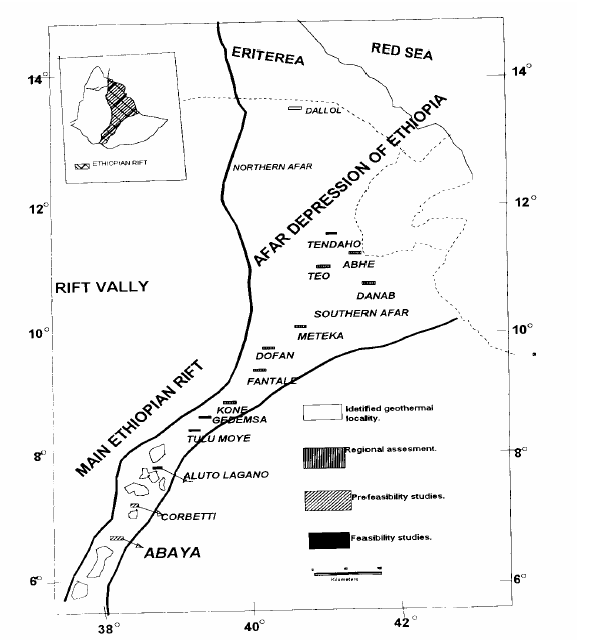


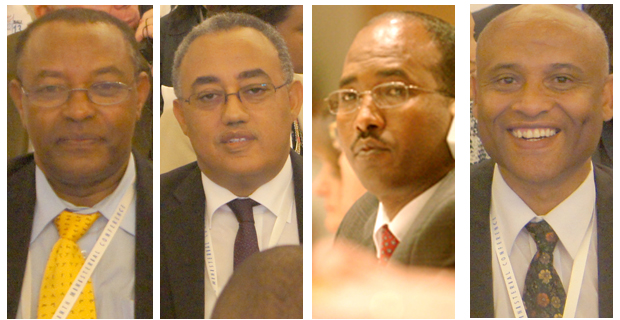
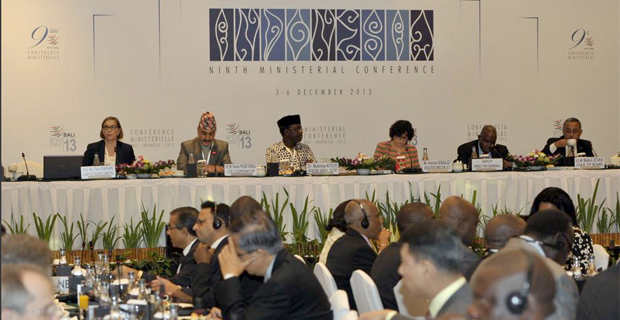
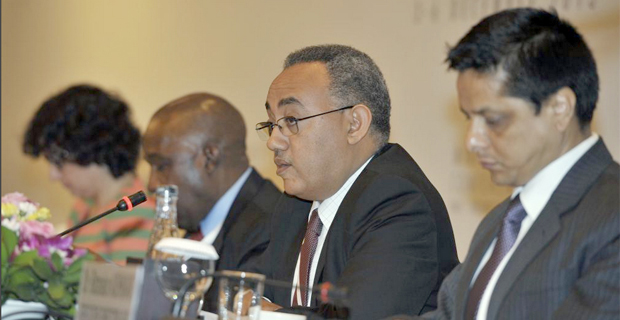


























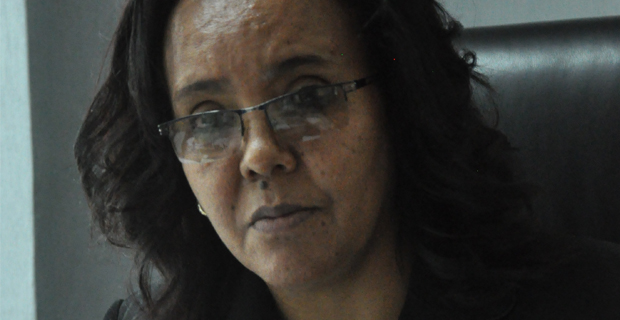




























 Ethiopian Minister of Agriculture, Tefera Derbew, visited Japan from 27 to 31 May upon the invitation of the Government of Japan.
Ethiopian Minister of Agriculture, Tefera Derbew, visited Japan from 27 to 31 May upon the invitation of the Government of Japan.



 A three day Ethio-South Africa Investment and Business Forum opened June 01 in Addis Ababa with representatives of over 25 South African companies involved in education, health, infrastructure, manufacturing and agro-processing taking part in the discussions on possible cooperation in trade and investment.
A three day Ethio-South Africa Investment and Business Forum opened June 01 in Addis Ababa with representatives of over 25 South African companies involved in education, health, infrastructure, manufacturing and agro-processing taking part in the discussions on possible cooperation in trade and investment.



























 Native residents of the Omo-Kuraz Sugar Development Project surrounding areas requested the government to foster the sugar development effort so that they can significantly benefit from the development.
Native residents of the Omo-Kuraz Sugar Development Project surrounding areas requested the government to foster the sugar development effort so that they can significantly benefit from the development.